2020 Dempsey Startup Competition Prizes Awarded
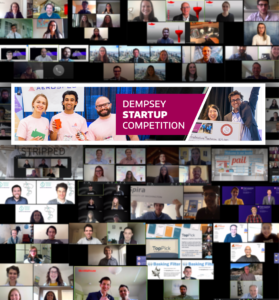 A son’s innovative, entrepreneurial mindset paired with his father’s expertise produced the grand prize winning idea at this year’s all-virtual Dempsey Startup Competition. Judges awarded ApnoMed the $25,000 Herbert B. Jones Foundation grand prize after the Final Round of the seven-week, multi-stage event hosted by the UW Foster School’s Buerk Center for Entrepreneurship. ApnoMed developed a non-surgical treatment that aims to cure sleep apnea symptoms. The University of Washington team grabbed the top spot from a field of 97 teams representing more than a dozen colleges and universities across the Pacific Northwest including British Columbia and Alaska.
A son’s innovative, entrepreneurial mindset paired with his father’s expertise produced the grand prize winning idea at this year’s all-virtual Dempsey Startup Competition. Judges awarded ApnoMed the $25,000 Herbert B. Jones Foundation grand prize after the Final Round of the seven-week, multi-stage event hosted by the UW Foster School’s Buerk Center for Entrepreneurship. ApnoMed developed a non-surgical treatment that aims to cure sleep apnea symptoms. The University of Washington team grabbed the top spot from a field of 97 teams representing more than a dozen colleges and universities across the Pacific Northwest including British Columbia and Alaska.
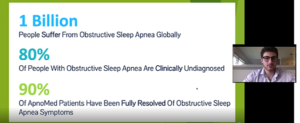 Founder Ryan Yousefian grew the early-stage business this past year as a Master of Science in Entrepreneurship student from a framework he and his father, a Bellevue orthodontist, created together. ApnoMed previously won the $15,000 IntuitiveX grand prize at the 2020 Hollomon Health Innovation Challenge.
Founder Ryan Yousefian grew the early-stage business this past year as a Master of Science in Entrepreneurship student from a framework he and his father, a Bellevue orthodontist, created together. ApnoMed previously won the $15,000 IntuitiveX grand prize at the 2020 Hollomon Health Innovation Challenge.
More than 350 entrepreneurs, investors, and industry leaders logged on to judge the 23rd annual event (prizes detailed below) formerly known as the Business Plan Competition. Awards were announced in a special presentation on the Buerk Center’s YouTube page.
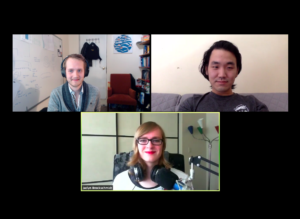 The $10,000 WRF Capital Second Place prize was awarded to Bluebox Labs. The UW team of engineering and computer science students adds a combination of Tesla software and innovative hardware to existing cars to protect and save thousands of dollars for working drivers. Bluebox Labs also won the $5,000 Glympse Internet of Things “Big Picture Prize” which goes to a business venture that incorporates new products or services that contribute to the ecosystem of interconnected devices.
The $10,000 WRF Capital Second Place prize was awarded to Bluebox Labs. The UW team of engineering and computer science students adds a combination of Tesla software and innovative hardware to existing cars to protect and save thousands of dollars for working drivers. Bluebox Labs also won the $5,000 Glympse Internet of Things “Big Picture Prize” which goes to a business venture that incorporates new products or services that contribute to the ecosystem of interconnected devices.
The $7,500 BECU Third Place Prize went to The 2050 Company. The team of MS in Entrepreneurship, informatics, and business students at UW are creating value-added food products that reduce waste in the food industry. 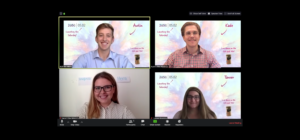 Their first product, the 2050 Smoothie, is made from rescued produce. The 2050 Company also won the $2,500 Thatcher & Shannon Davis Best Consumer Product Idea which is award to a venture that offers a compelling new consumer product focused on a well-defined market.
Their first product, the 2050 Smoothie, is made from rescued produce. The 2050 Company also won the $2,500 Thatcher & Shannon Davis Best Consumer Product Idea which is award to a venture that offers a compelling new consumer product focused on a well-defined market.
A duo of teenage entrepreneurs captured the $5,000 Friends of the Dempsey Startup Fourth Place prize. The 16- and 17-year old computer science students at UW created Spira—an AI service for telehealth that enables someone to get a clinical quality respiratory disease screening with just a smartphone. Spira also earned the $2,500 Premera Best Health & Wellness Impact Idea prize which goes to a venture with significant potential to prevent, diagnose, or treat diseases or disorders that impact human health.
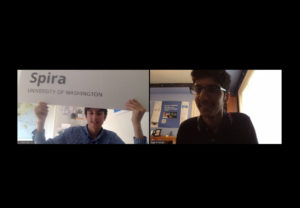 Seven additional Best Idea and Big Picture prizes were awarded to teams who advanced to the Top-30 Investment Round in April. The $5,000 MOD Pizza Social Impact Prize went to Arogya. The UW team of bioengineering and psychology students created an integrated washer/dryer that provides a non-electric solution for households in low-resource areas to clean and disinfect clothing. The Social Impact Prize recognizes a venture that “not only demonstrates the capacity to deliver financial performance, but also shows how it makes a positive contribution to society.”
Seven additional Best Idea and Big Picture prizes were awarded to teams who advanced to the Top-30 Investment Round in April. The $5,000 MOD Pizza Social Impact Prize went to Arogya. The UW team of bioengineering and psychology students created an integrated washer/dryer that provides a non-electric solution for households in low-resource areas to clean and disinfect clothing. The Social Impact Prize recognizes a venture that “not only demonstrates the capacity to deliver financial performance, but also shows how it makes a positive contribution to society.”
Team Finding Eco won the $2,500 eBay Best Marketplace Idea prize, which recognizes a team that creates a commerce or payments platform for communities of buyers, sellers, or businesses. The team of MS in Entrepreneurship students at UW created an e-commerce site that helps individuals use less single-use plastic in their daily life through sustainable products and education.
Aquagga won the $2,500 Perkins Coie Best Innovation/Technology prize, which recognizes a venture that has a new application for a current or disruptive technology or idea that represents a substantial improvement. The team of engineering students from UW and the University of Alaska-Fairbanks uses advanced manufacturing to produce bolt-on water treatment platforms that destroy toxic water contaminants, such as PFAS, with supercritical water.
Votegrity won the $2,500 DLA Piper Best Idea with Global Reach prize, which recognizes a venture that aspires for acquiring customers around the world. The team of Seattle University business and economics students created an online experience intended to create a world of “informed voters” with security and audit capabilities.
Basking Filter from the University of Oregon won the $2,500 David and Patty Helberg Smukowski Best Sustainable Advantage prize. The award recognizes a venture that has incorporated best practices toward resource reduction while bolstering profitability and cost containment. The team of business and architecture students created a self-cleaning filter based on the adaptations of the basking shark.
Career Compass from UW won the $2,500 Saara Romu Foundation Community Impact Prize which recognizes a venture that has a direct impact on the lives of women or other underserved communities. The team of computer science and business students created a one-stop web platform for affordable group coaching, current resources, and interactive networks for women in STEM.
The Subline won the $2,500 Voyager Capital Best Business to Business Idea prize, which recognizes a venture with an innovative B2B product or platform. The team of UW HCDE and MBA students uses prescriptive analytics to minimize the time restaurants spend managing inventory while recapturing losses from operational waste.
In the past 23 years of the competition, more than 5,400 students have participated, and 196 teams have been awarded undiluted seed funding totaling more than $1.53 million. Overall, the Buerk Center has awarded more than $3.7 million dollars to students since 1998 through multiple competitions and the Jones + Foster Accelerator.
